2023年高考英语复习常用语法——时态课件(51张ppt)
文档属性
| 名称 | 2023年高考英语复习常用语法——时态课件(51张ppt) |  | |
| 格式 | pptx | ||
| 文件大小 | 163.5KB | ||
| 资源类型 | 教案 | ||
| 版本资源 | 通用版 | ||
| 科目 | 英语 | ||
| 更新时间 | 2023-02-12 10:19:18 | ||
图片预览

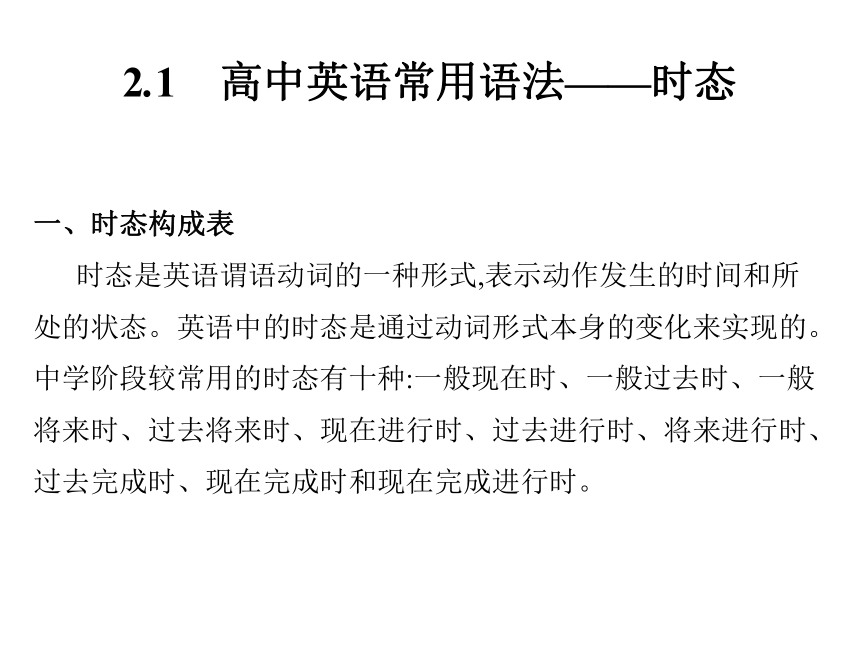


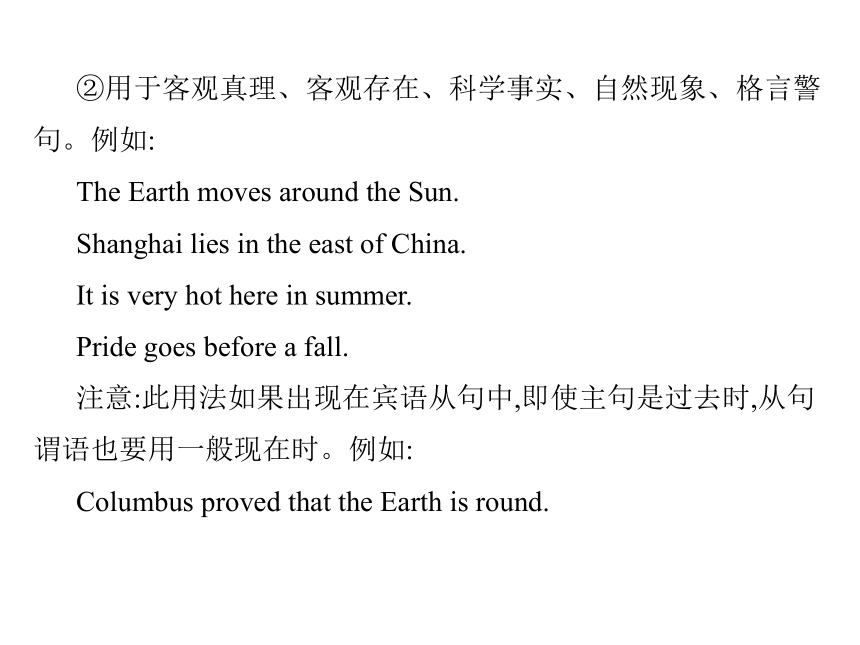
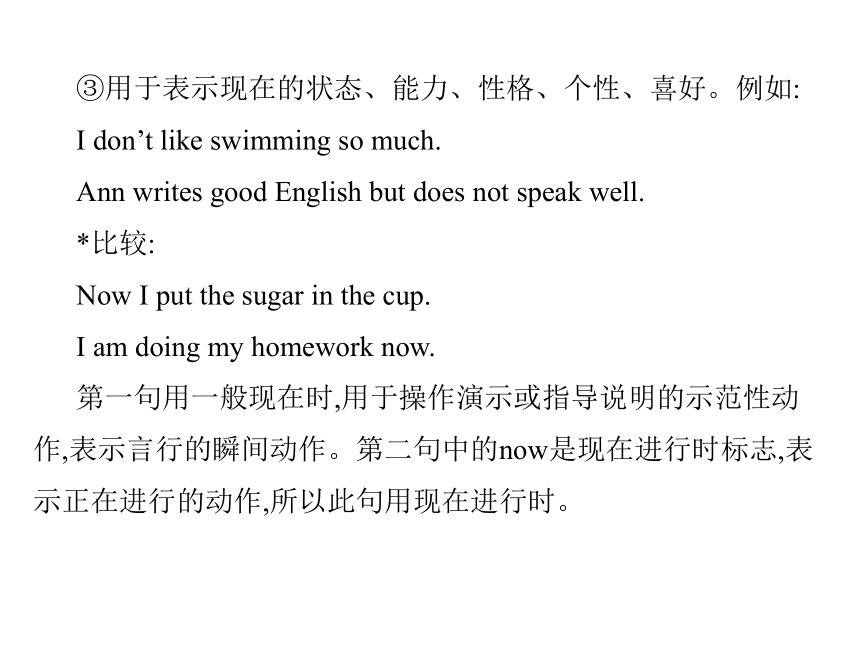
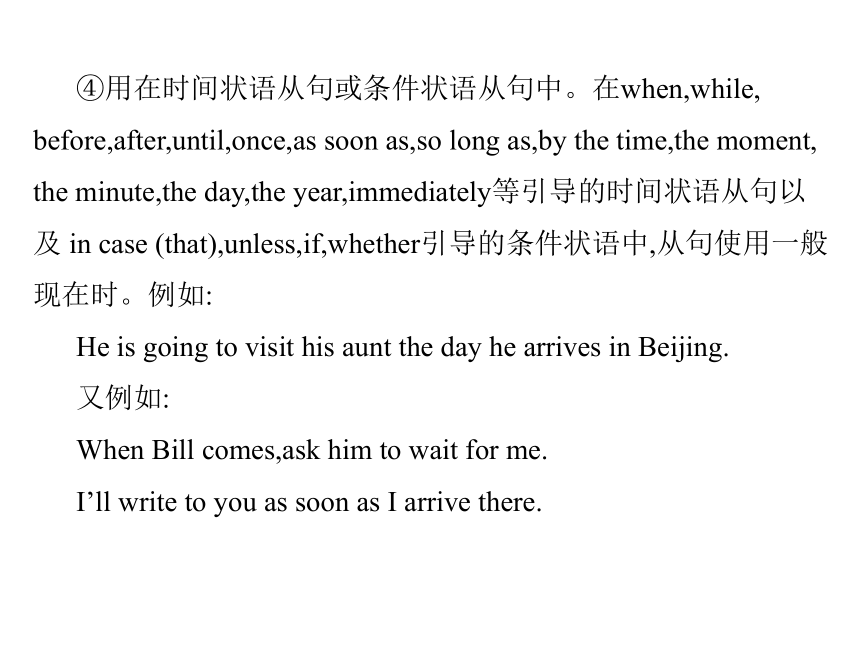
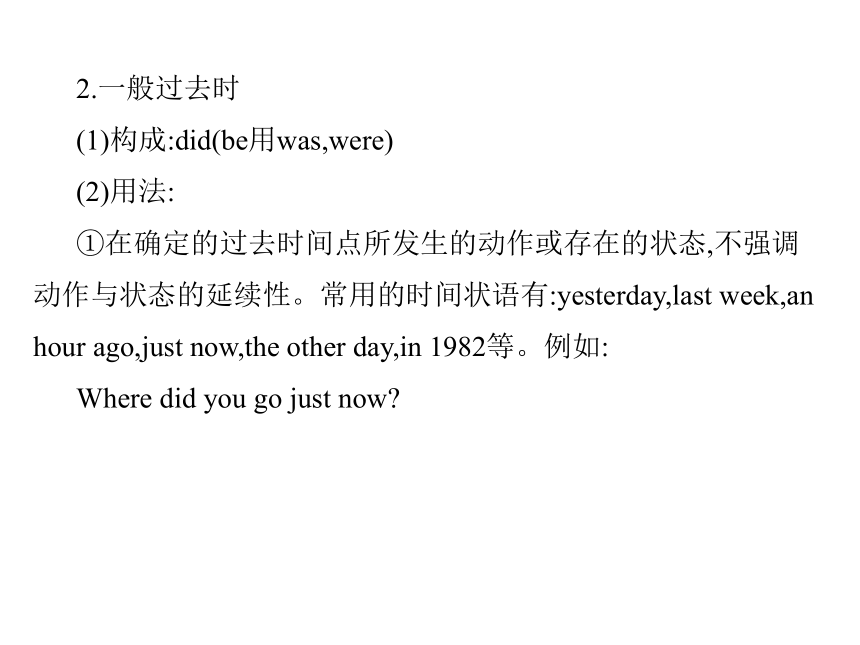
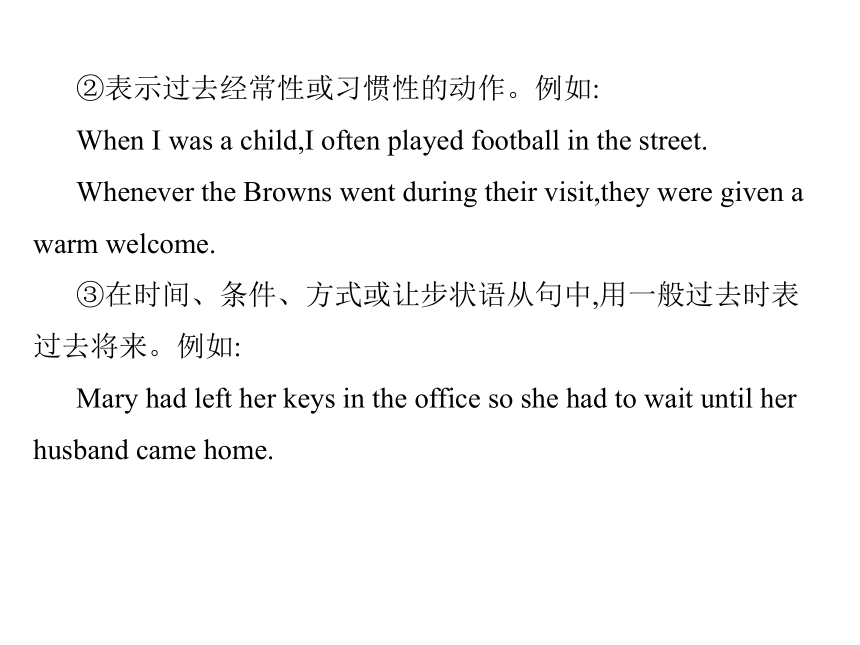
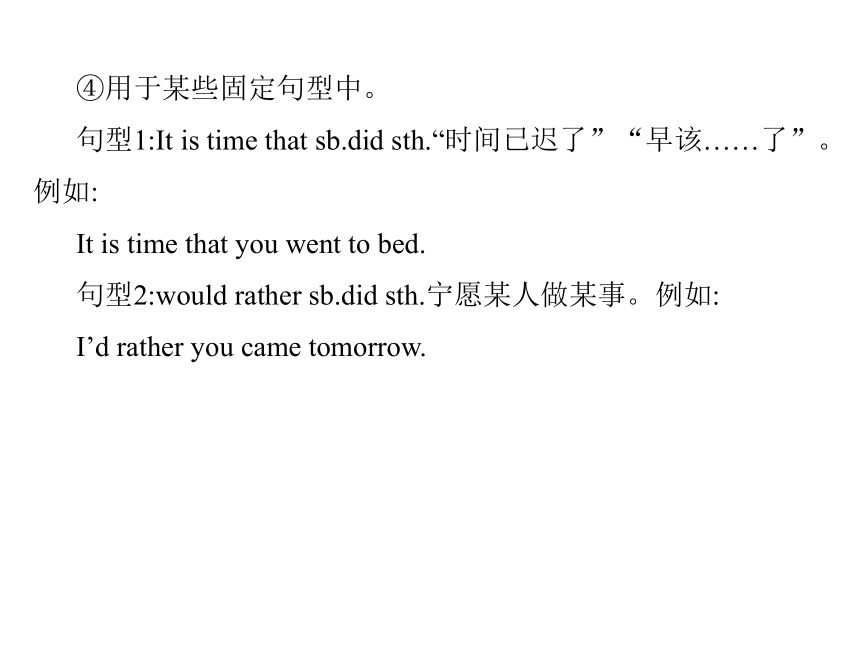
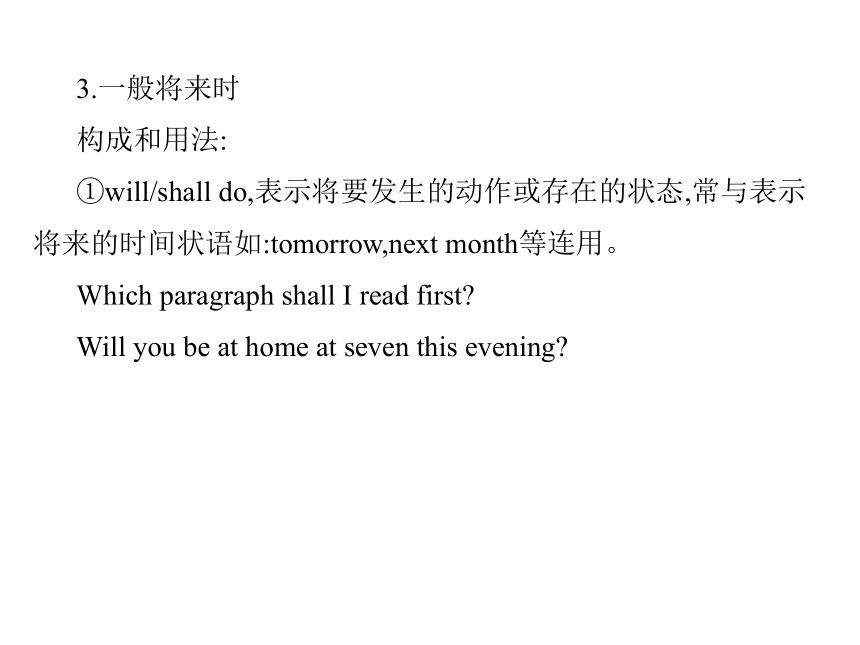
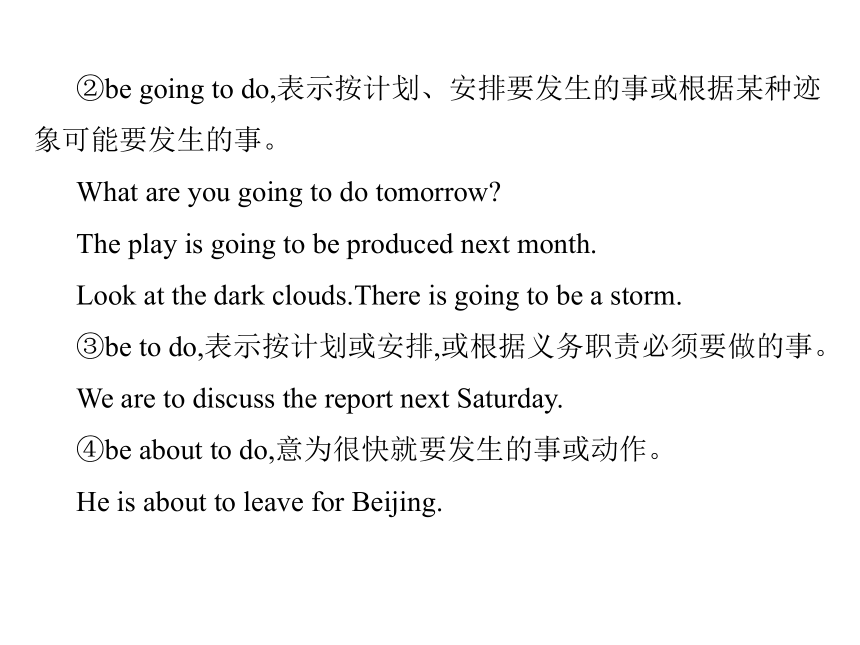
文档简介
(共52张PPT)
高三英语总复习基础部分
——语法讲解篇
2.1 高中英语常用语法——时态
一、时态构成表
时态是英语谓语动词的一种形式,表示动作发生的时间和所处的状态。英语中的时态是通过动词形式本身的变化来实现的。中学阶段较常用的时态有十种:一般现在时、一般过去时、一般将来时、过去将来时、现在进行时、过去进行时、将来进行时、过去完成时、现在完成时和现在完成进行时。
时态 现在时 过去时 将来时 过去将来时
一般 一般现在时 do/does am/is/are+adj. 一般过去时 did was/were+adj. 一般将来时 will/be going to do/ be(about) to do 过去将来时
would do
进行 现在进行时 am/is/are doing 过去进行时 was/were doing 将来进行时 will be doing
完成 现在完成时 have/has done 过去完成时 had done 将来完成时 will have done
完成进行 现在完成进行时 have/has been doing
二、相关知识点精讲
1.一般现在时
(1)构成:do/does(be用am,is,are)
(2)用法:
①用于描述经常性或习惯性的动作,常与表示频度的时间状语连用。时间状语:everyday,sometimes,often,usually,always, at...o’clock,on Sunday等。例如:
I leave home for school at 7 every morning.
②用于客观真理、客观存在、科学事实、自然现象、格言警句。例如:
The Earth moves around the Sun.
Shanghai lies in the east of China.
It is very hot here in summer.
Pride goes before a fall.
注意:此用法如果出现在宾语从句中,即使主句是过去时,从句谓语也要用一般现在时。例如:
Columbus proved that the Earth is round.
③用于表示现在的状态、能力、性格、个性、喜好。例如:
I don’t like swimming so much.
Ann writes good English but does not speak well.
*比较:
Now I put the sugar in the cup.
I am doing my homework now.
第一句用一般现在时,用于操作演示或指导说明的示范性动作,表示言行的瞬间动作。第二句中的now是现在进行时标志,表示正在进行的动作,所以此句用现在进行时。
④用在时间状语从句或条件状语从句中。在when,while, before,after,until,once,as soon as,so long as,by the time,the moment, the minute,the day,the year,immediately等引导的时间状语从句以及 in case (that),unless,if,whether引导的条件状语中,从句使用一般现在时。例如:
He is going to visit his aunt the day he arrives in Beijing.
又例如:
When Bill comes,ask him to wait for me.
I’ll write to you as soon as I arrive there.
2.一般过去时
(1)构成:did(be用was,were)
(2)用法:
①在确定的过去时间点所发生的动作或存在的状态,不强调动作与状态的延续性。常用的时间状语有:yesterday,last week,an hour ago,just now,the other day,in 1982等。例如:
Where did you go just now
②表示过去经常性或习惯性的动作。例如:
When I was a child,I often played football in the street.
Whenever the Browns went during their visit,they were given a warm welcome.
③在时间、条件、方式或让步状语从句中,用一般过去时表过去将来。例如:
Mary had left her keys in the office so she had to wait until her husband came home.
④用于某些固定句型中。
句型1:It is time that sb.did sth.“时间已迟了”“早该……了”。例如:
It is time that you went to bed.
句型2:would rather sb.did sth.宁愿某人做某事。例如:
I’d rather you came tomorrow.
3.一般将来时
构成和用法:
①will/shall do,表示将要发生的动作或存在的状态,常与表示将来的时间状语如:tomorrow,next month等连用。
Which paragraph shall I read first
Will you be at home at seven this evening
②be going to do,表示按计划、安排要发生的事或根据某种迹象可能要发生的事。
What are you going to do tomorrow
The play is going to be produced next month.
Look at the dark clouds.There is going to be a storm.
③be to do,表示按计划或安排,或根据义务职责必须要做的事。
We are to discuss the report next Saturday.
④be about to do,意为很快就要发生的事或动作。
He is about to leave for Beijing.
4.现在完成时
(1)构成:has/have done
(2)用法
①表示之前已发生或完成的动作或状态,其结果的影响现在还存在。
I have finished my homework already.
②表示发生在过去但持续到现在的动作或状态。常与for a long time,since+过去时间点,so far,ever,never,just,yet,till/until now, up to now,in the past few years,already,recently,lately等时间状语连用。
Helen has worked in our school for almost five years.
Tom has lived in the city since 1990.
③常用现在完成时的句型。
句型1:It is the first/second time...that...结构中的从句部分,用现在完成时。
It is the first time that I have visited the city.
句型2:This is the first time (that) I’ve heard him sing.
*注意:It was the third time that the boy had been late.
句型3:This is+形容词最高级+that...结构,that从句要用现在完成时。
This is the best film that I’ve (ever) seen.
5.一般过去时与现在完成时的比较
(1)一般过去时表示过去某时间点发生的动作或单纯叙述过去的事情,只强调动作,不强调动作是否延续,也不强调动作是否产生影响;现在完成时为过去发生的动作延续到现在或对现在有影响,强调的是对现在的影响。
(2)一般过去时常与表示过去某一具体时间点的时间状语连用,而现在完成时通常与模糊地表示一段时间的时间状语连用,或无时间状语。
一般过去时的时间状语:yesterday,last week,...ago,in 1980,in last October,just now等,皆为具体的时间状语。
现在完成时的时间状语:for+时间段,since,so far,ever,never,just, yet,till/until now,up to now,in the past few years等,皆为不确定的表示时间段的时间状语。
(3)现在完成时可表示持续到现在的动作或状态,动词一般是延续性的,如live,teach,learn,work,study,know。
一般过去时常用的非持续性动词有come,go,leave,start,die, finish,get married等。例如:
I saw this film yesterday.(强调看的动作发生过了)
I have seen this film.(强调对现在的影响,电影的内容已经知道了)
Why did you get up so early (强调起床的动作已发生过了)
Who hasn’t handed in his paper (强调有卷子未交,疑为不公平竞争)
He got married last year.(强调去年发生了结婚的动作)
He has been married for three months.(强调已婚的状态是持续性的)
句子中如有过去时的时间状语(如yesterday,last week,in 1960)时,不能使用现在完成时,要用过去时。例如:
(错)Tom has written a letter to his parents last night.
(对)Tom wrote a letter to his parents last night.
6.过去完成时
(1)构成:had done
(2)用法:表示发生在过去之前的动作或存在的状态。
①在told,said,knew,heard,thought等动词后的宾语从句。例如:
She said (that) she had never been to Paris.
②状语从句,在过去不同时间发生的两个动作中,发生在先,用过去完成时;发生在后,用一般过去时。例如:
When the police arrived,the thieves had run away.
③用于表示意向的动词后构成虚拟语气,如hope,wish,expect, think,intend,mean,suppose等,用过去完成时表示“原本……,未能……”。例如:
We had hoped that you would come,but you didn’t.
④过去完成时常与以下时间状语连用:before/by the end of+过去时间等。例如:
By the end of last week,they had finished their tasks.
I had graduated before last month.
7.将来完成时
(1)构成:will have done
(2)用法:
①状态完成:表示某事继续到将来某一时间为止一直有的状态。例如:
They will have been married for 20 years by then.
②动作完成:表示将来某一时间或另一个将来的动作之前,已经完成的动作或获得的经验。例如:
You will have reached Shanghai by this time tomorrow.
8.现在进行时
(1)构成:am/is/are doing
(2)用法:
①表示现在(指说话人说话时)正在发生的事情。例如:
We are waiting for you.
②习惯进行:表示长期的或重复性的动作,说话时动作未必正在进行。例如:
Mr.Green is writing another novel.格林先生在写另一部小说。(说话时未在写,只处于写作状态。)
③表示渐变,这样的动词有:get,grow,become,turn,run,go,begin等。例如:
The leaves are turning red.
It’s getting warmer and warmer.
④与always,constantly,forever 等词连用,表示反复发生的动作或持续存在的状态,往往带有说话人的主观色彩。例如:
You are always changing your mind.
⑤可以表示近期按计划或安排将要发生的动作,常与动词come,go,arrive,leave,start,begin,return连用。例如:
I’m leaving tomorrow.
Are you staying here till next week
9.过去进行时
(1)构成:was/were doing
(2)用法:
①表示过去某时正在进行的状态或动作。常用的时间状语有this morning,the whole morning,all day yesterday,from nine to ten last evening等。例如:
At this time yesterday,we were having an examination.
②过去进行时的主要用法是描述一件事发生的背景;一个长动作延续的时候,另一个短动作发生。例如:
My brother fell while he was riding his bicycle and hurt himself.
It was raining when they left the station.
When I got to the top of the mountain,the sun was shining.
10.过去将来时
(1)构成:would do,was/were going to do,was/were (about) to do
(2)用法:
①表示从过去某一时间看将要发生的动作或存在的状态,常用在宾语从句或间接引语中。例如:
He didn’t expect that we would all be there.
I didn’t know if they were going to see me off at the airport.
John was about to leave for Guangzhou.
②表示过去习惯性的动作,常与过去的时间状语从句连用。例如:
Whenever she had time,she would do some reading.
11.将来进行时
(1)构成:will/shall be doing
(2)用法:表示将来某时进行的状态或动作,或按预测将来会发生的事情。常用的时间状语有soon,tomorrow,this evening,on Sunday,by this time tomorrow,in two days,tomorrow evening等。例如:
She’ll be coming soon.
I’ll be meeting him sometime in the future.
By this time tomorrow,I’ll be lying on the beach.
12.现在完成进行时
(1)构成:have/has been doing
(2)用法:表示动作从某一时间开始,一直持续到现在,或者刚刚终止,或者可能仍然要继续下去。例如:
I have been working here for five years.
They have been living in this city for ten years.
时态专项练习
一、用所给词的正确形式填空。
1.I’ll give the book to him as soon as he (come) back.
2.Has the baby (stop) crying yet
3.I don’t know whether mother (take) me to Beijing next month.
4.She (put) on her coat and went out.
5.—What are they doing
—They (get) ready for the sports meeting.
are getting
stopped
will take
put
comes
6.The boy asked his mother (let) him go and play basketball.
7.I’m sorry to keep you (wait) for a long time.
8.It (take) him half an hour (finish) his homework yesterday.
9.If it (be) an interesting film,we’ll see it tomorrow.
10.They usually (do) their homework after supper.
11.Listen!Who (sing) in the next room now
12.She didn’t want to stay in bed while all the others
(work) in the fields.
to let
waiting
took to finish
is
do
is singing
were working
13.Mr.Yu (teach) us math since 1982.
14.They will have a trip to the Great Wall if it (not rain) tomorrow.
15.Li Ming often (listen) to the radio in the morning.
16.—Father,may I go out and play football
— you (do) your homework
17.Our teacher told us if it (not snow) we would visit the Science Museum the next day.
18.—What are you doing,Dad
—I (mend) the radio.
has taught
doesn’t rain
listens
didn’t snow
Have done
am mending
19.Let’s (carry) the boxes to the house.
20.I have been studying here for four years.By next June,
I (graduate).
21.I (write) to you as soon as I get to Shanghai.
22.Don’t make any noise.Grandma (sleep).
23.His aunt (do) some cooking when he came in.
24.When they (reach) the station,the train had already left.
25.There (be) a meeting next Monday.
26.We (know) each other since our boyhood.
carry
will have graduated
will write
is sleeping
was doing
reached
will be
have known
27.They (go) abroad for further study after their graduation.
28.Wei Fang isn’t here.She (go) to the reading-room.
29.Helen (make) many friends since she came to Paris.
30.Look! The young worker (show) the students around the factory now.
31.The windows of our lab (clean) once a week.
32.I hope that they (repair) the road by the time we come back.
will go
went
has made
is showing
are cleaned
will have repaired
33.My son (draw) a picture but I didn’t know what it was.
34.He (say) that he was a lawyer.
35.She said her family (hide) from the army during the war.
36.He (hurt) his back when he was playing basketball.
37.Mary (have) a nice car.
38.The man (live) in the countryside.
39.My legs (shake) now.
40.When I (wait) for the lift,he called me back.
drew
said
had hidden
hurt
has
lives
are shaking
was waiting
41.Up till now,we (learn) 3,000 words.
42.I (write) him three letters before he came back.
43.It is the first time that I (hear) him say those words.
44.He asked me where I (be) last summer.
45.By the time he was ten years old,he (learn) English very well.
46.The students (clean)their classroom when the visitors arrived.
have learned/learnt
had written
have heard
was
had learned/learnt
had cleaned
47.By next October,Jessica (work) here for five years.
48.By the end of this year,I (earn) enough money for a holiday.
49.I can’t attend the party tonight.I (see) my boss for something important.
50.I am really tired.I (paint) the living room all day.
will have worked
will have earned
am going to see
have painted
二、真题演练
1.(2022·全国一卷)The plan will extend protection to a significant number of areas that (be) previously unprotected.
2.(2022·全国甲卷)In the last five years,Cao (walk) through 34 counties in six continents.
3.(惠州市2022届高三第三次调研考试)On Saturday night,a five-person team of the Chinese e-sports club,with the full name EDward Gaming, (win) the 2021 League of Legends (LoL) World Championship in Iceland.
were
has walked
won
4.[2022年广东省普通高等学校招生全国统一考试模拟测试(二)] Combining Chinese music and global folk music,he (post) 17 videos so far on social media platforms,gaining millions of views.
5.(2022年深圳市高三年级第二次调研考试)It is roughly estimated that there (be) at least a thousand paintings in the gallery.
6.[2022年1月普通高等学校招生全国统一考试(浙江卷)]Many of them climate scientists (promise) to fly as little as possible since the effort started two years ago.
has posted
are
have promised
7.[2021~2022 学年佛山市普通高中高三教学质量检测(二)]As the world’s first “dual Olympic city”,it (pay) attention to the details in every aspect to support the safe and smooth operation of the Games.
8.(2022年山东省济宁市高考模拟考试)They____________
(create) in 2020 after experiments showed that under the right lab conditions,the cells formed small structures that could gather,move and work together in groups and self-heal.
paid
were created
9.(2022年山东省济宁市高考模拟考试)In response to the worries,the researchers claim that the living machines are entirely contained in a lab,which (mean) that the risks are manageable and stoppable.
10.[2021年全国统一高考英语试卷(新高考Ⅰ)]You can’t help wondering how hard it (be) for the people then to put all those rocks into place.
11.[2021年全国统一高考英语试卷(新高考Ⅱ)]One of the biggest companies I wrote to (be) Alaska Airlines Paris.
means
was
was
12.(2021·全国甲卷)It (build) originally to protect the city in the Tang dynasty.
13.(2021·浙江省试题)But Lincoln’s home in downtown Springfield,Illinois, (prove) irresistible to visitors since it opened to the public.
was built
has proved
14.(2021·浙江)After Lincoln was elected President of the US in 1861,they rented the house and (sell) most of their furniture.
15.(2021 ·浙江)Lincoln’s home in downtown Springfield,Illinois,
(prove) irresistible to visitors since it opened to the public.
16.(2020 全国Ⅰ卷)Often,only a small part of a museum’s collection (be) on display.
17.(2020·全国Ⅰ卷)The 80,000 objects collected by Sir Hans Sloane,for example, (form) the core collection of the British Museum that opened in 1759.
sold
proved
is
formed
18.(2019·全国Ⅰ卷)In recent years some Inuit people in Nunavut
(report) increases in bear sightings around human settlements.
19.(2019·全国Ⅱ卷)Picking up her “Lifetime Achievement” award,proud Irene (declare) she had no plans to retire from her 36-year-old business.
20.(2019·全国Ⅱ卷)I love coming here and seeing my family and all the friends I (make) over the years.
21.(2019·全国Ⅲ卷)Our hosts shared many of their experiences and (recommend) wonderful places to eat.
have reported
declared
have made
were recommended
22.(2021·深圳市第一次模拟考试)She,together with her teammates, (help) villagers sell nearly 500,000 kilograms of oranges every week.
23.(2018·北京卷)—Hi,I’m Peter.Are you new here I haven’t seen you around
—Hello,Peter.I’m Bob.I just (start) on Monday.
24.(2018·北京卷)Susan had quit her well-paid job and
(work) as a volunteer in the neighborhood when I visited her last year.
helps
started
worked
25.(2018·北京卷)China’s high-speed railways (grow) from 9,000 to 25,000 kilometers in the past few years.
26.(2018·江苏卷)Hopefully in 2025 we will no longer be
e-mailing each other,for we (develop) more convenient electronic communication tools by then.
have grown
will have developed
三、翻译句子
1.那边出了什么事
2.他们已经答复了我们的信。
3.她昨天离开这里到上海去了。
4.我上中学的时候总是六点起床。
What happened there
They have responded to our letter.
She left here for Shanghai yesterday.
I got up at six when was in middle school.
5.昨天这个时候,我们正在上英语课。
6.我母亲做饭的时候,我姐姐在看电视。
7.她给你打电话的时候,你在干什么
8.昨天当我到达电影院的时候,电影已经开始半个小时了。
We were having the English class at this time yesterday.
While my mom was cooking,my sister was watching TV.
What were you doing when she called you
The film had been on for half an hour when I arrived at the cinema.
9.假如明天不下雨,我打算去市中心购物。
10.他经常向他的父母要钱。
11.别担心,我们会想出一个更好的主意的。
12.因为家里的米吃完了,所以我们今晚要去一下超市。
If it doesn’t rain tomorrow,I plan to go to the shopping mall.
He always asks his parents for money.
Don’t worry.We will come up with a better idea.
Becasue we run out of rice,we are going to the supermarket tonight.
13.很幸运,我们在下雨之前到家了。
14.我告诉她我那天下午会去看她。
15.昨天在课上老师说,地球围着太阳转。
Luckily,we got home before it rained.
I told her I would see her that afternoon.
The teacher said in class yesterday that the earth moves around the sun.
高三英语总复习基础部分
——语法讲解篇
2.1 高中英语常用语法——时态
一、时态构成表
时态是英语谓语动词的一种形式,表示动作发生的时间和所处的状态。英语中的时态是通过动词形式本身的变化来实现的。中学阶段较常用的时态有十种:一般现在时、一般过去时、一般将来时、过去将来时、现在进行时、过去进行时、将来进行时、过去完成时、现在完成时和现在完成进行时。
时态 现在时 过去时 将来时 过去将来时
一般 一般现在时 do/does am/is/are+adj. 一般过去时 did was/were+adj. 一般将来时 will/be going to do/ be(about) to do 过去将来时
would do
进行 现在进行时 am/is/are doing 过去进行时 was/were doing 将来进行时 will be doing
完成 现在完成时 have/has done 过去完成时 had done 将来完成时 will have done
完成进行 现在完成进行时 have/has been doing
二、相关知识点精讲
1.一般现在时
(1)构成:do/does(be用am,is,are)
(2)用法:
①用于描述经常性或习惯性的动作,常与表示频度的时间状语连用。时间状语:everyday,sometimes,often,usually,always, at...o’clock,on Sunday等。例如:
I leave home for school at 7 every morning.
②用于客观真理、客观存在、科学事实、自然现象、格言警句。例如:
The Earth moves around the Sun.
Shanghai lies in the east of China.
It is very hot here in summer.
Pride goes before a fall.
注意:此用法如果出现在宾语从句中,即使主句是过去时,从句谓语也要用一般现在时。例如:
Columbus proved that the Earth is round.
③用于表示现在的状态、能力、性格、个性、喜好。例如:
I don’t like swimming so much.
Ann writes good English but does not speak well.
*比较:
Now I put the sugar in the cup.
I am doing my homework now.
第一句用一般现在时,用于操作演示或指导说明的示范性动作,表示言行的瞬间动作。第二句中的now是现在进行时标志,表示正在进行的动作,所以此句用现在进行时。
④用在时间状语从句或条件状语从句中。在when,while, before,after,until,once,as soon as,so long as,by the time,the moment, the minute,the day,the year,immediately等引导的时间状语从句以及 in case (that),unless,if,whether引导的条件状语中,从句使用一般现在时。例如:
He is going to visit his aunt the day he arrives in Beijing.
又例如:
When Bill comes,ask him to wait for me.
I’ll write to you as soon as I arrive there.
2.一般过去时
(1)构成:did(be用was,were)
(2)用法:
①在确定的过去时间点所发生的动作或存在的状态,不强调动作与状态的延续性。常用的时间状语有:yesterday,last week,an hour ago,just now,the other day,in 1982等。例如:
Where did you go just now
②表示过去经常性或习惯性的动作。例如:
When I was a child,I often played football in the street.
Whenever the Browns went during their visit,they were given a warm welcome.
③在时间、条件、方式或让步状语从句中,用一般过去时表过去将来。例如:
Mary had left her keys in the office so she had to wait until her husband came home.
④用于某些固定句型中。
句型1:It is time that sb.did sth.“时间已迟了”“早该……了”。例如:
It is time that you went to bed.
句型2:would rather sb.did sth.宁愿某人做某事。例如:
I’d rather you came tomorrow.
3.一般将来时
构成和用法:
①will/shall do,表示将要发生的动作或存在的状态,常与表示将来的时间状语如:tomorrow,next month等连用。
Which paragraph shall I read first
Will you be at home at seven this evening
②be going to do,表示按计划、安排要发生的事或根据某种迹象可能要发生的事。
What are you going to do tomorrow
The play is going to be produced next month.
Look at the dark clouds.There is going to be a storm.
③be to do,表示按计划或安排,或根据义务职责必须要做的事。
We are to discuss the report next Saturday.
④be about to do,意为很快就要发生的事或动作。
He is about to leave for Beijing.
4.现在完成时
(1)构成:has/have done
(2)用法
①表示之前已发生或完成的动作或状态,其结果的影响现在还存在。
I have finished my homework already.
②表示发生在过去但持续到现在的动作或状态。常与for a long time,since+过去时间点,so far,ever,never,just,yet,till/until now, up to now,in the past few years,already,recently,lately等时间状语连用。
Helen has worked in our school for almost five years.
Tom has lived in the city since 1990.
③常用现在完成时的句型。
句型1:It is the first/second time...that...结构中的从句部分,用现在完成时。
It is the first time that I have visited the city.
句型2:This is the first time (that) I’ve heard him sing.
*注意:It was the third time that the boy had been late.
句型3:This is+形容词最高级+that...结构,that从句要用现在完成时。
This is the best film that I’ve (ever) seen.
5.一般过去时与现在完成时的比较
(1)一般过去时表示过去某时间点发生的动作或单纯叙述过去的事情,只强调动作,不强调动作是否延续,也不强调动作是否产生影响;现在完成时为过去发生的动作延续到现在或对现在有影响,强调的是对现在的影响。
(2)一般过去时常与表示过去某一具体时间点的时间状语连用,而现在完成时通常与模糊地表示一段时间的时间状语连用,或无时间状语。
一般过去时的时间状语:yesterday,last week,...ago,in 1980,in last October,just now等,皆为具体的时间状语。
现在完成时的时间状语:for+时间段,since,so far,ever,never,just, yet,till/until now,up to now,in the past few years等,皆为不确定的表示时间段的时间状语。
(3)现在完成时可表示持续到现在的动作或状态,动词一般是延续性的,如live,teach,learn,work,study,know。
一般过去时常用的非持续性动词有come,go,leave,start,die, finish,get married等。例如:
I saw this film yesterday.(强调看的动作发生过了)
I have seen this film.(强调对现在的影响,电影的内容已经知道了)
Why did you get up so early (强调起床的动作已发生过了)
Who hasn’t handed in his paper (强调有卷子未交,疑为不公平竞争)
He got married last year.(强调去年发生了结婚的动作)
He has been married for three months.(强调已婚的状态是持续性的)
句子中如有过去时的时间状语(如yesterday,last week,in 1960)时,不能使用现在完成时,要用过去时。例如:
(错)Tom has written a letter to his parents last night.
(对)Tom wrote a letter to his parents last night.
6.过去完成时
(1)构成:had done
(2)用法:表示发生在过去之前的动作或存在的状态。
①在told,said,knew,heard,thought等动词后的宾语从句。例如:
She said (that) she had never been to Paris.
②状语从句,在过去不同时间发生的两个动作中,发生在先,用过去完成时;发生在后,用一般过去时。例如:
When the police arrived,the thieves had run away.
③用于表示意向的动词后构成虚拟语气,如hope,wish,expect, think,intend,mean,suppose等,用过去完成时表示“原本……,未能……”。例如:
We had hoped that you would come,but you didn’t.
④过去完成时常与以下时间状语连用:before/by the end of+过去时间等。例如:
By the end of last week,they had finished their tasks.
I had graduated before last month.
7.将来完成时
(1)构成:will have done
(2)用法:
①状态完成:表示某事继续到将来某一时间为止一直有的状态。例如:
They will have been married for 20 years by then.
②动作完成:表示将来某一时间或另一个将来的动作之前,已经完成的动作或获得的经验。例如:
You will have reached Shanghai by this time tomorrow.
8.现在进行时
(1)构成:am/is/are doing
(2)用法:
①表示现在(指说话人说话时)正在发生的事情。例如:
We are waiting for you.
②习惯进行:表示长期的或重复性的动作,说话时动作未必正在进行。例如:
Mr.Green is writing another novel.格林先生在写另一部小说。(说话时未在写,只处于写作状态。)
③表示渐变,这样的动词有:get,grow,become,turn,run,go,begin等。例如:
The leaves are turning red.
It’s getting warmer and warmer.
④与always,constantly,forever 等词连用,表示反复发生的动作或持续存在的状态,往往带有说话人的主观色彩。例如:
You are always changing your mind.
⑤可以表示近期按计划或安排将要发生的动作,常与动词come,go,arrive,leave,start,begin,return连用。例如:
I’m leaving tomorrow.
Are you staying here till next week
9.过去进行时
(1)构成:was/were doing
(2)用法:
①表示过去某时正在进行的状态或动作。常用的时间状语有this morning,the whole morning,all day yesterday,from nine to ten last evening等。例如:
At this time yesterday,we were having an examination.
②过去进行时的主要用法是描述一件事发生的背景;一个长动作延续的时候,另一个短动作发生。例如:
My brother fell while he was riding his bicycle and hurt himself.
It was raining when they left the station.
When I got to the top of the mountain,the sun was shining.
10.过去将来时
(1)构成:would do,was/were going to do,was/were (about) to do
(2)用法:
①表示从过去某一时间看将要发生的动作或存在的状态,常用在宾语从句或间接引语中。例如:
He didn’t expect that we would all be there.
I didn’t know if they were going to see me off at the airport.
John was about to leave for Guangzhou.
②表示过去习惯性的动作,常与过去的时间状语从句连用。例如:
Whenever she had time,she would do some reading.
11.将来进行时
(1)构成:will/shall be doing
(2)用法:表示将来某时进行的状态或动作,或按预测将来会发生的事情。常用的时间状语有soon,tomorrow,this evening,on Sunday,by this time tomorrow,in two days,tomorrow evening等。例如:
She’ll be coming soon.
I’ll be meeting him sometime in the future.
By this time tomorrow,I’ll be lying on the beach.
12.现在完成进行时
(1)构成:have/has been doing
(2)用法:表示动作从某一时间开始,一直持续到现在,或者刚刚终止,或者可能仍然要继续下去。例如:
I have been working here for five years.
They have been living in this city for ten years.
时态专项练习
一、用所给词的正确形式填空。
1.I’ll give the book to him as soon as he (come) back.
2.Has the baby (stop) crying yet
3.I don’t know whether mother (take) me to Beijing next month.
4.She (put) on her coat and went out.
5.—What are they doing
—They (get) ready for the sports meeting.
are getting
stopped
will take
put
comes
6.The boy asked his mother (let) him go and play basketball.
7.I’m sorry to keep you (wait) for a long time.
8.It (take) him half an hour (finish) his homework yesterday.
9.If it (be) an interesting film,we’ll see it tomorrow.
10.They usually (do) their homework after supper.
11.Listen!Who (sing) in the next room now
12.She didn’t want to stay in bed while all the others
(work) in the fields.
to let
waiting
took to finish
is
do
is singing
were working
13.Mr.Yu (teach) us math since 1982.
14.They will have a trip to the Great Wall if it (not rain) tomorrow.
15.Li Ming often (listen) to the radio in the morning.
16.—Father,may I go out and play football
— you (do) your homework
17.Our teacher told us if it (not snow) we would visit the Science Museum the next day.
18.—What are you doing,Dad
—I (mend) the radio.
has taught
doesn’t rain
listens
didn’t snow
Have done
am mending
19.Let’s (carry) the boxes to the house.
20.I have been studying here for four years.By next June,
I (graduate).
21.I (write) to you as soon as I get to Shanghai.
22.Don’t make any noise.Grandma (sleep).
23.His aunt (do) some cooking when he came in.
24.When they (reach) the station,the train had already left.
25.There (be) a meeting next Monday.
26.We (know) each other since our boyhood.
carry
will have graduated
will write
is sleeping
was doing
reached
will be
have known
27.They (go) abroad for further study after their graduation.
28.Wei Fang isn’t here.She (go) to the reading-room.
29.Helen (make) many friends since she came to Paris.
30.Look! The young worker (show) the students around the factory now.
31.The windows of our lab (clean) once a week.
32.I hope that they (repair) the road by the time we come back.
will go
went
has made
is showing
are cleaned
will have repaired
33.My son (draw) a picture but I didn’t know what it was.
34.He (say) that he was a lawyer.
35.She said her family (hide) from the army during the war.
36.He (hurt) his back when he was playing basketball.
37.Mary (have) a nice car.
38.The man (live) in the countryside.
39.My legs (shake) now.
40.When I (wait) for the lift,he called me back.
drew
said
had hidden
hurt
has
lives
are shaking
was waiting
41.Up till now,we (learn) 3,000 words.
42.I (write) him three letters before he came back.
43.It is the first time that I (hear) him say those words.
44.He asked me where I (be) last summer.
45.By the time he was ten years old,he (learn) English very well.
46.The students (clean)their classroom when the visitors arrived.
have learned/learnt
had written
have heard
was
had learned/learnt
had cleaned
47.By next October,Jessica (work) here for five years.
48.By the end of this year,I (earn) enough money for a holiday.
49.I can’t attend the party tonight.I (see) my boss for something important.
50.I am really tired.I (paint) the living room all day.
will have worked
will have earned
am going to see
have painted
二、真题演练
1.(2022·全国一卷)The plan will extend protection to a significant number of areas that (be) previously unprotected.
2.(2022·全国甲卷)In the last five years,Cao (walk) through 34 counties in six continents.
3.(惠州市2022届高三第三次调研考试)On Saturday night,a five-person team of the Chinese e-sports club,with the full name EDward Gaming, (win) the 2021 League of Legends (LoL) World Championship in Iceland.
were
has walked
won
4.[2022年广东省普通高等学校招生全国统一考试模拟测试(二)] Combining Chinese music and global folk music,he (post) 17 videos so far on social media platforms,gaining millions of views.
5.(2022年深圳市高三年级第二次调研考试)It is roughly estimated that there (be) at least a thousand paintings in the gallery.
6.[2022年1月普通高等学校招生全国统一考试(浙江卷)]Many of them climate scientists (promise) to fly as little as possible since the effort started two years ago.
has posted
are
have promised
7.[2021~2022 学年佛山市普通高中高三教学质量检测(二)]As the world’s first “dual Olympic city”,it (pay) attention to the details in every aspect to support the safe and smooth operation of the Games.
8.(2022年山东省济宁市高考模拟考试)They____________
(create) in 2020 after experiments showed that under the right lab conditions,the cells formed small structures that could gather,move and work together in groups and self-heal.
paid
were created
9.(2022年山东省济宁市高考模拟考试)In response to the worries,the researchers claim that the living machines are entirely contained in a lab,which (mean) that the risks are manageable and stoppable.
10.[2021年全国统一高考英语试卷(新高考Ⅰ)]You can’t help wondering how hard it (be) for the people then to put all those rocks into place.
11.[2021年全国统一高考英语试卷(新高考Ⅱ)]One of the biggest companies I wrote to (be) Alaska Airlines Paris.
means
was
was
12.(2021·全国甲卷)It (build) originally to protect the city in the Tang dynasty.
13.(2021·浙江省试题)But Lincoln’s home in downtown Springfield,Illinois, (prove) irresistible to visitors since it opened to the public.
was built
has proved
14.(2021·浙江)After Lincoln was elected President of the US in 1861,they rented the house and (sell) most of their furniture.
15.(2021 ·浙江)Lincoln’s home in downtown Springfield,Illinois,
(prove) irresistible to visitors since it opened to the public.
16.(2020 全国Ⅰ卷)Often,only a small part of a museum’s collection (be) on display.
17.(2020·全国Ⅰ卷)The 80,000 objects collected by Sir Hans Sloane,for example, (form) the core collection of the British Museum that opened in 1759.
sold
proved
is
formed
18.(2019·全国Ⅰ卷)In recent years some Inuit people in Nunavut
(report) increases in bear sightings around human settlements.
19.(2019·全国Ⅱ卷)Picking up her “Lifetime Achievement” award,proud Irene (declare) she had no plans to retire from her 36-year-old business.
20.(2019·全国Ⅱ卷)I love coming here and seeing my family and all the friends I (make) over the years.
21.(2019·全国Ⅲ卷)Our hosts shared many of their experiences and (recommend) wonderful places to eat.
have reported
declared
have made
were recommended
22.(2021·深圳市第一次模拟考试)She,together with her teammates, (help) villagers sell nearly 500,000 kilograms of oranges every week.
23.(2018·北京卷)—Hi,I’m Peter.Are you new here I haven’t seen you around
—Hello,Peter.I’m Bob.I just (start) on Monday.
24.(2018·北京卷)Susan had quit her well-paid job and
(work) as a volunteer in the neighborhood when I visited her last year.
helps
started
worked
25.(2018·北京卷)China’s high-speed railways (grow) from 9,000 to 25,000 kilometers in the past few years.
26.(2018·江苏卷)Hopefully in 2025 we will no longer be
e-mailing each other,for we (develop) more convenient electronic communication tools by then.
have grown
will have developed
三、翻译句子
1.那边出了什么事
2.他们已经答复了我们的信。
3.她昨天离开这里到上海去了。
4.我上中学的时候总是六点起床。
What happened there
They have responded to our letter.
She left here for Shanghai yesterday.
I got up at six when was in middle school.
5.昨天这个时候,我们正在上英语课。
6.我母亲做饭的时候,我姐姐在看电视。
7.她给你打电话的时候,你在干什么
8.昨天当我到达电影院的时候,电影已经开始半个小时了。
We were having the English class at this time yesterday.
While my mom was cooking,my sister was watching TV.
What were you doing when she called you
The film had been on for half an hour when I arrived at the cinema.
9.假如明天不下雨,我打算去市中心购物。
10.他经常向他的父母要钱。
11.别担心,我们会想出一个更好的主意的。
12.因为家里的米吃完了,所以我们今晚要去一下超市。
If it doesn’t rain tomorrow,I plan to go to the shopping mall.
He always asks his parents for money.
Don’t worry.We will come up with a better idea.
Becasue we run out of rice,we are going to the supermarket tonight.
13.很幸运,我们在下雨之前到家了。
14.我告诉她我那天下午会去看她。
15.昨天在课上老师说,地球围着太阳转。
Luckily,we got home before it rained.
I told her I would see her that afternoon.
The teacher said in class yesterday that the earth moves around the sun.
